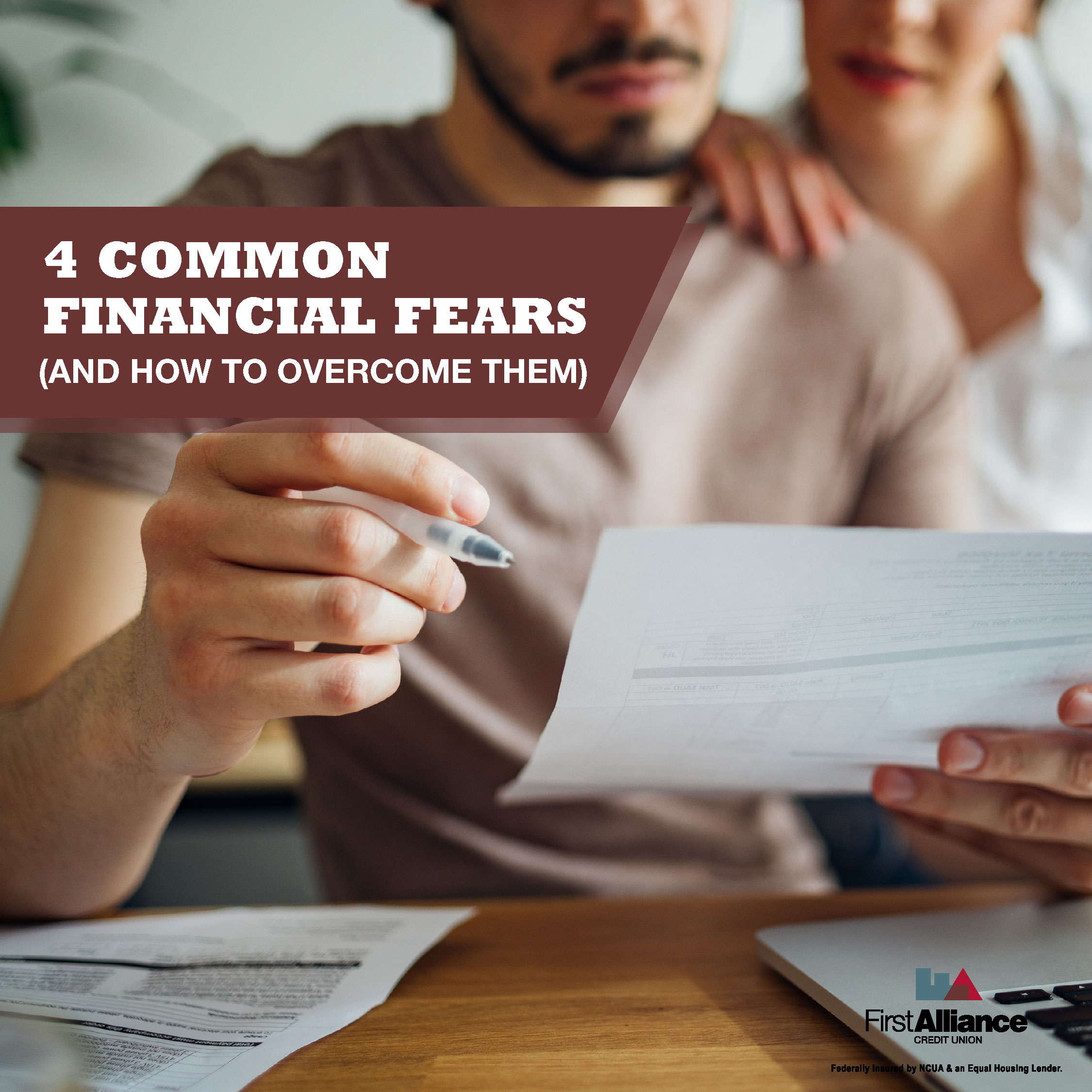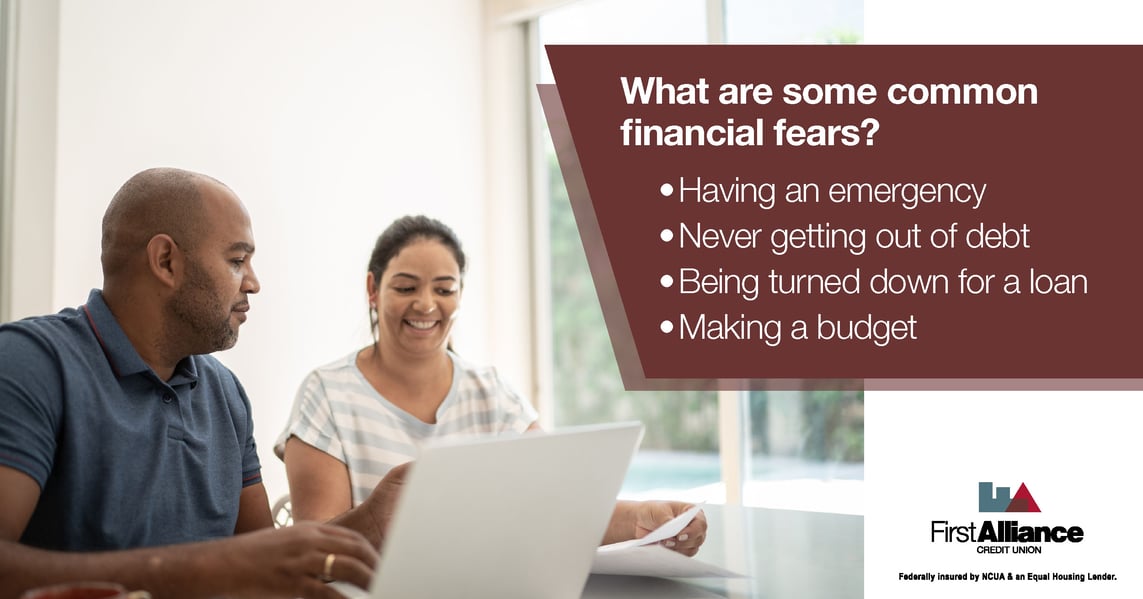5 Unique Ways to Eliminate Fears and Doubts Regarding Your Finances
If your finances are a regular source of stress and anxiety, you are not alone. Some people avoid paying bills until the last minute because of the...
5 min read
 Chris Gottschalk
:
Jul 26, 2022 4:45:00 AM
Chris Gottschalk
:
Jul 26, 2022 4:45:00 AM

What’s the one thing holding most people back from financial success? Believe it or not, it isn’t lack of money. It’s fear—fear that you’ll get laughed out of a bank or credit union if you apply for a loan, fear that you’ll lose your job and never be able to repay your debs and fear that finances are so complex that one false move will condemn you to bankruptcy and ruin.
 The truth is that money fears are like most other fears. Once you know how to confront them, they’re not that scary anymore.
The truth is that money fears are like most other fears. Once you know how to confront them, they’re not that scary anymore.
If there’s one money fear that looms above all others, it’s the thought of having an emergency that will cost more than you can afford. What happens if you or someone in your family has a serious illness? What if you get in an accident and can’t afford the repairs?
The best way to overcome this financial fear is by starting an emergency fund and regularly putting money from each paycheck into it. An emergency fund is the ultimate backup plan, and it can not only help you pay for any unexpected expenses that spring up--it can also help ease financial stress, since you know you'll have enough money to take care of an emergency without having to go into debt.
Most financial experts recommend putting in around 10% of each paycheck, and you can use direct deposit to make the process automatic. Ideally, you should have around three to six months of income set aside in your emergency fund, but the truth is that if you have at least $2,000 you should be able to cover most financial emergencies, especially if you have insurance.
It's worth pointing out that after you've been saving for a while, you might want to put your emergency fund into a different type of savings account, one that has a higher rate of interest so your emergency account can grow faster. You can open a money market account if you have the minimum deposit requirement for instance, or you could put part of your emergency fund in a certificate of deposit (CD).
This is another big money fear, and it’s closely related to the previous one. What happens if you get into debt, either because you had a financial emergency or because you simply lost track of your spending?
If you do happen to get into debt, the most important thing is to not beat yourself up. Getting into debt in the 21st century can be frighteningly easy, and a lot of people have fallen into the trap of overspending. You should also know that getting out of debt may take some time, but it is possible.
The first step to getting out of debt is to stop adding to your debt load. Don’t use your credit card unless it’s absolutely necessary. After that, write down all your debts and figure out which one you should pay down first, which should either be your biggest debt or your smallest.
Once you’ve selected a debt to pay off, throw all your extra money at that debt until it’s gone. Then you can use that payment to start paying off your next debt and continue the process until you’re debt free.
Depending on the debts you have, you might also want to look into getting a debt consolidation loan that will reduce the number of payments you make each month down to one. If you have high-interest debt like credit card debt, you can even potentially save money by getting a lower interest rate on the money you owe.
Getting a loan should be exciting, since it’s usually for a big-ticket item that you wouldn’t be able to afford on your own. However, the process of applying for a loan can be daunting, and a lot of people worry that they’ll be humiliated if their finances aren’t good enough to get approved.
If you’re worried about whether you’ll be able to get a loan or not, there are some things you can do before you apply to stack the odds in your favor. You can take a look at your credit score, and if it isn’t high enough you can take steps to improve it before applying for a loan. Another way to make getting approved for a loan more likely is to figure out in advance how much your monthly payments will be by using a loan calculator and figuring out where the money for your monthly loan payment will come from.
It’s worth pointing out that you can also set up a meeting with a First Alliance lending advisor and talk about why you’d like a loan and get personal advice on what you can do to prepare before submitting your application. They’ll be happy to guide you through the loan approval process, and even if they aren’t able to get your loan approved they’ll help you to figure out what you need to do to not only get a loan, but also improve your financial situation.

Creating a monthly budget has a lot of advantages, but the idea stresses a lot of people out. They’re afraid they won’t be able to spend money on the things they really want, or that creating a budget will reveal something about their finances that will keep them poor for their rest of their lives.
If you’re worried about this, you should be aware that if you’re bringing in money and spending it, you already have a budget—you just don’t know what it is. Writing down your budget will just give you a clearer picture of where your money is going, and if you’re okay with everything you’ve been spending money on, you don’t have to change anything.
Talking about money fears with loved ones or a professional can benefit your well-being by providing emotional support, practical advice, and a sense of relief. It helps in reducing stress and anxiety, gaining different perspectives, and finding solutions to financial challenges.
While you might be scared of some financial issues, you don't have to let them rule your life. You can develop a healthy relationship with money by facing your money fears, setting financial goals and seeking support from professionals and loved ones. You don't have to go it alone!
Money fears — from surprise bills to looming debt and “budget dread” — melt away when you know where to turn. Visit First Alliance Credit Union to get free guidance, member‑first rates, and easy‑to‑use tools that turn fear into financial freedom:
Emergency fund first‑aid – Automate a small deposit from every paycheck so surprises don’t wreck your wallet or use enroll in Round Up Saving. You can save money every time your swipe your debit card!
Debt‑free roadmap – Pick one balance, attack it, roll the payment forward, or consolidate to a single, lower‑rate loan.
Loan‑ready confidence – Check your score, use our calculators, and chat with a lending advisor before you apply.
Stress‑free budgeting – Your money already has a budget; writing it down just puts you in the driver’s seat.
Facing the facts beats fearing them — and you never have to go it alone.

If your finances are a regular source of stress and anxiety, you are not alone. Some people avoid paying bills until the last minute because of the...

Simply hearing the words IRS strikes fear into the hearts of many Americans. Scam artists capitalize on that fear and frequently claim to be IRS...

We’ve all dreamed about the fun things we’d do if we were to suddenly get a large sum of money, whether it’s from winning the lottery or getting an...